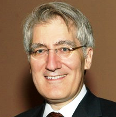GEORGE, Robert
 Robert GeorgeProfessor Robert George holds Princeton's celebrated McCormick Chair in Jurisprudence and is the founding director of the James Madison Program. He has served on the President's Council on Bioethics and as a presidential appointee to the United States Commission on Civil Rights. He has also served on UNESCO’s World Commission on the Ethics of Science and Technology, of which he continues to be a corresponding member.
Robert GeorgeProfessor Robert George holds Princeton's celebrated McCormick Chair in Jurisprudence and is the founding director of the James Madison Program. He has served on the President's Council on Bioethics and as a presidential appointee to the United States Commission on Civil Rights. He has also served on UNESCO’s World Commission on the Ethics of Science and Technology, of which he continues to be a corresponding member.
Professor George is a former Judicial Fellow at the Supreme Court of the United States, where he received the Justice Tom C. Clark Award. He is the author of In Defense of Natural Law, Making Men Moral: Civil Liberties and Public Morality, and The Clash of Orthodoxies: Law, Religion and Morality in Crisis, and co-author of Embryo: A Defense of Human Life and Body-Self Dualism in Contemporary Ethics and Politics. His scholarly articles and reviews have appeared in such journals as the Harvard Law Review, the Yale Law Journal, the Columbia Law Review, the American Journal of Jurisprudence, and the Review of Politics.
Professor George is a recipient of many honors and awards, including the Presidential Citizens Medal, the Honorific Medal for the Defense of Human Rights of the Republic of Poland, the Canterbury Medal of the Becket Fund for Religious Liberty, the Sidney Hook Memorial Award of the National Association of Scholars, the Philip Merrill Award of the American Council of Trustees and Alumni, the Bradley Prize for Intellectual and Civic Achievement and the Stanley Kelley, Jr. Teaching Award from Princeton's Department of Politics. He was the 2007 John Dewey Lecturer in the Philosophy of Law at Harvard, the 2008 Judge Guido Calabresi Lecturer in Law and Religion at Yale, the 2008 Sir Malcolm Knox Lecturer in Philosophy at the University of St. Andrews, and the 2010 Frank Irvine Lecturer in Law at Cornell University. He is a member of the Council on Foreign Relations, and holds honorary doctorates of law, ethics, science, letters, civil law, humane letters, and juridical science. A graduate of Swarthmore College and Harvard Law School, he also received a master’s degree in theology from Harvard and a doctorate in philosophy of law from Oxford University.

